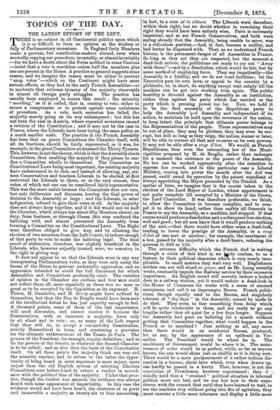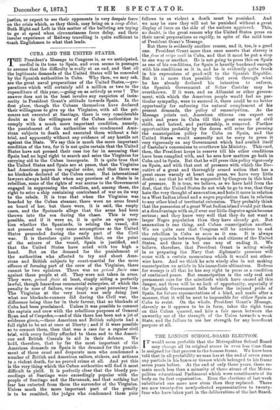TOPICS OF THE DAY.
THE LATEST EFFORT OF THE LEFT.
THERE is no subject in all Continental politics upon which it is so difficult to form an opinion as the wisdom or folly of Parliamentary secessions. In England forty Members make a quorum, but constitution-makers abroad, even when avowedly copying our procedure, invariably, or almost invariably —for we have a doubt about the Swiss method in some Cantons —insist that a vote is worthless unless half the members plus one are present in the House. A practice so general suggests some reason, and we imagine the reason must be either to prevent "snap votes "—which on the Continent might have most serious effects, as they had in the early French Assemblies--or to moderate that extreme tyranny of the majority observable
in almost all foreign party struggles. The practice has usually been employed to secure this result ; the minority "seceding," as it is called, that is, ceasing to vote, either to secure a compromise or to protest against some unfairness of procedure. As a rule, such secession has failed, the majority merely going on its way unhampered ; but this has not been the case in Austria, where repeated secessions caused a revision of the Constitution ; and it may not be the case in France, where the Liberals have been trying the same policy on a much smaller scale. The practice in the French Assembly has been that on grave Committees the Chamber itself, with all its fractions, should be fairly represented, as it was, for example, in the great Committee nicknamed the Thirty Tyrants. This, however, is not the theory, which is that the Assembly elects Committees, thus enabling the majority if they please to con- fine a Committee wholly to themselves. The Committee on Constitutional Laws being most important, the existing majority have endeavoured to do this, and instead of allowing, say, six- teen Conservatives and fourteen Liberals to be elected, at first restricted the Liberals to three, or at the very utmost, four votes, of which not one can be considered fairly representative. This was the more unfair because the Committee does not vote, but only deliberates and discusses, leaving the final power of decision to the Assembly at large ; and the Liberals, in utter indignation, refused to give their votes at all. As the majority does not always keep together, and if it did would not be half the Chamber, which always has about fifty Members absent, on duty, from business, or through illness, this step rendered the balloting void, and almost prevented the Assembly from forming a Committee on the Constitutional Laws. The Right were therefore obliged to give way, and by allowing the election of two members from the Left Centre, to induce enough of that party to vote to make the balloting legal. The final result of abstention, therefore, was slightly beneficial to the Liberals, who, however unjustly treated, were, we conceive, in the right in giving way.
It does not appear to us that the Liberals were in any way transgressing Parliamentary rules, as they were only using the forms of the House to prevent undeniable oppression, and an oppression intended to avoid the full discussion for which Assemblies and Committees professedly exist. The varieties of opinion in the Chamber are endless, and four wen could not reflect them all, more especially as there was no man so great as to be accepted by the Opposition as its exponent. M. Thiers, M. Gambetta, and M. Grevy might have sufficed by themselves, but then the Duc de Broglie would have been sure of the intellectual defeat he has just capacity enough to feel. A thousand points, some of them of the last importance, will need discussion, and cannot receive it beoause the Conservatives, with so immense a majority, have only to sit silent and to vote ; or, as many of the Left expect that they will do, to accept a cut-and-dry Constitution, strictly Monarchical in form, and containing a provision for the ultimate enthronement of the Comte de Paris. The powers of the President, for example, require definition ; and so do the powers of the Senate, or whatever the Second Chamber is to be called ; and so also does the basis of the Constitution itself. On all these points the majority think one way and the minority another, and to refuse to the latter the oppor- tunity of being heard in mere argument is most unjust, more unjust than the old English system of selecting Election Committees sure before-band to return a verdict in accord- ance with the political bias of the majority. Under that prac- tice, though the verdict was assured, the evidence was always heard with some appearance of impartiality. In this case the evidence would not have been heard, the existence of so great and immovable a majority as twenty-six to four amounting,
in fact, to a vote of /a cloture. The Liberals were therefore, within their right, but we doubt whether in exercising their right they would have been entirely wise. Paris is extremely impatient, and so are French Conservatives, and both were saying already that the Assembly, being unable to move, was in a ridiculous position,—had, in fact, become a nullity, and had better be dispensed with. That, as we understand French history, is the permanent danger of all Assemblies in France. So long as they act they are respected, but the moment a dead-lock arrives, the politicians are ready to cry out "Away with them!"—not by a dissolution, which would be fair, but by some method of employing force. They say impatiently—the Assembly is a futility, and we do not want futilities ; let the Executive pass its own laws, or appeal to the country by a plebiscite, or, in short, do anything except wait calmly till the machine can be got into working trim again. The public hostility is directed against the Assembly as an institution, rather than against the party which has seceded or the party which is pressing power too far. Now, we hold it to be the first necessity of the Republican party to help the Assembly °qua Assembly and independent of its action, to maintain its hold upon the reverence of the nation, to keep intact the principle that ultimate power belongs to the Representatives of the people. Those representatives may be out of place, they may be plotters, they may even be cor- rupt, but still so long as they reign, the nation, sooner or later, will be able to correct all that and re-enter on its own powers. It may not be able after a coup &at. We would, as French Republicans, bear even the astounding law of the Muni- cipalities proposed by M. de Broglie, rather than endanger for a moment the existence or the power of the Assembly. No law can be worked oppressively after the intention to oppress has ceased, and in this particular case a Liberal Ministry, coming into power the month after the Act was passed, could annul its operation by the patent expedient of always appointing the Mayor presented by the Council. As a matter of form, we imagine that is the course taken in the election of the Lord Mayor of London, whose appointment is not quite complete till accepted by a Minister of the Crown, the Lord Chancellor. It was therefore preferable, we think, to allow the Committee to become complete, and to com- pel it to show its hand, rather than enable all Generals in France to say the Assembly, as a machine, had stopped. If that course would produce a dissolution and a subsequent free election, well and good ; but all men know that it would produce nothing of the sort,—that there would have either come a dead-lock, tending to lower the prestige of the Assembly, or a coup d' itat of one sort or another ; for example, the enactment of a law, passed by the majority after a dead-heave, reducing the quorum to 200 or 150.
The extreme difficulty which the French find in waiting through a crisis of this kind is, we Wily confess, to us a feature in their political character whie-h is very nearly inex- plicable. In small matters they wait very well. Englishmen neither can nor will stand en queue, and as Mr. Laing recently wrote, constantly impede the Railway service by their excessive impatience. An English crowd will scarcely endure a locked door in a railway station, yet it would endure a dead-lock in the House of Commons for weeks with a sense of amused annoyance, and call it an impromptu Recess. French politi- cians, though equally used to the Recess, and singularly tolerant of "dry days" in the Assembly, cannot be made to do that. They seem to fear something from delay which will be quite intolerable to them, and are ready to go any lengths rather than sit quiet for a few days longer. Suppose the Assembly had gone on balloting for a month without, getting that Committee together, what would happen to the French or to mankind ? Just nothing at all, any more than there would in an accidental Recess, produced, let us say, by the appearance of an epidemic in Ver- sailles. The President would be where he is. The machinery of Government would be where it is. The main- tenance of order would be as perfect, while, so far as anyone knows, the sun would shine just as chillily as it is doing now. There would be a mere postponement of a rather tedious dis- cussion in a bureau, about laws which, even when drawn up, can hardly be passed in a hurry. That, however, is not the conviction of Frenchmen, however experienced; they d cidedly hold that a " strained " political situation in internal politics must not last, and we can but bow to their expe- rience, with the remark that until they have learned to wait, to see the machine stop without going into fits of agitation, they must exercise a little more tolerance and display a little more justice, or expect to see their opponents in very despair force on the crisis which, as they think, may bring on a coup critat. Both Right and Left in this matter of the balloting are trying to go at speed when circumstances force delay, and their insular experience of Railway travelling is quite sufficient to 'teach Englishmen to what that leads.







































 Previous page
Previous page